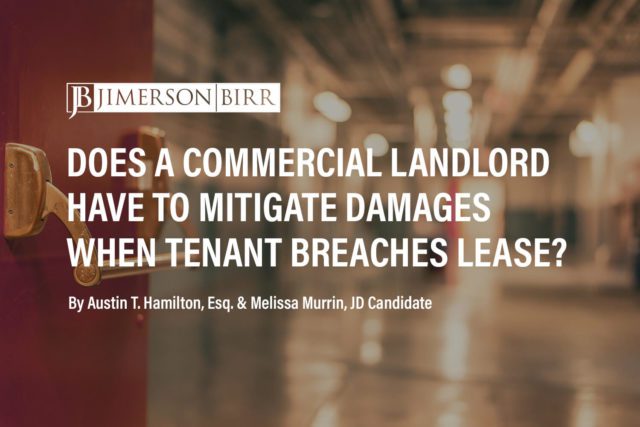What are holdover tenants?
A holdover tenant is a tenant who remains in possession of a commercial property after the lease term has expired. In Florida, commercial landlords and tenants must abide by Florida Statutes § 83.001-83.251. Under these statutes, holdover tenancy arises when the tenant continues to occupy the premises without the landlord’s consent. As a result, the holdover tenant is subject to eviction and may be liable for damages.
For example, a business leases a commercial space for one year. At the end of the lease term, the tenant remains in possession without entering into a new lease agreement or obtaining permission from the landlord. In this case, the tenant becomes a holdover tenant under Florida law. The landlord may choose to evict the tenant or accept rent and establish a new tenancy.
Need a commercial leasing advocate? Schedule your consultation today with a top commercial landlord/tenant leasing attorney.
In Florida, which laws and regulations apply to holdover tenants?
Florida’s laws and regulations regarding holdover tenants are found primarily within the Florida Statutes, specifically § 83.04 and § 83.05. Section 83.04 addresses holdover tenancy, stating that if the tenant continues to possess the property after the lease term ends without the landlord’s permission, the tenancy becomes a tenancy at sufferance. In this case, the tenant is liable for double the rent due for the period they continue to occupy the premises without the landlord’s consent.
Section 83.05 outlines the termination of tenancy, which includes notice requirements for terminating a tenancy at will or by the entireties. This section applies when the holdover tenant becomes a tenant at will, as the landlord may choose to accept rent and establish a new tenancy. In such cases, the landlord must follow the statutory notice requirements to terminate the new tenancy.
How does holding over commonly lead to litigation between commercial landlords and tenants?
The following issues commonly lead to litigation:
- Eviction proceedings: Landlords may initiate eviction proceedings when a tenant remains in possession of the property after the lease term has expired. Disputes can arise over the proper notice and eviction procedures under Florida Statutes § 83.20.
- Rent payment disputes: Conflicts may emerge regarding the amount of rent due, mainly when holdover tenants are charged double the rent under Florida Statutes § 83.04.
- Lease renewal negotiations: Tensions can arise when negotiating a new lease, with disagreements over rent, lease terms, and property improvements.
- Property damage: Landlords and holdover tenants may clash over responsibility for damages or necessary repairs during the holdover period.
- Security deposit disputes: Landlords may withhold security deposits for unpaid rent, damages, or other lease violations, leading to disputes over the legitimacy of these claims.
When a set of facts is appropriate for legal intervention, there are many paths a claimant may take. We are value-based attorneys at Jimerson Birr, which means we look at each action with our clients from the point of view of costs and benefits while reducing liability. Then, based on our client’s objectives, we chart a path to seek appropriate remedies.
To determine whether your unique situation may necessitate litigation or another form of specialized advocacy, please contact our office to set up your initial consultation.
How should counsel for commercial landlords draft, review, and negotiate a lease that mitigates litigation risks?
Counsel should consider the following to protect their clients:
- Clearly define lease terms and termination: Ensure the lease explicitly outlines the lease term, any renewal options, and termination procedures. Specify the required notice period for termination or renewal.
- Establish holdover provisions: Include a clause addressing holdover tenancy, specifying any increased rent during the holdover period and the consequences of remaining in possession without consent.
- Negotiate dispute resolution methods: Incorporate alternative dispute resolution methods, such as mediation or arbitration, to address potential disputes before litigation.
- Outline maintenance and repair responsibilities: Clearly define the landlord and tenant’s duties regarding maintenance and repairs to avoid disputes during the holdover period.
- Include security deposit terms: Specify the conditions under which the landlord may withhold a security deposit and the procedures for returning the deposit upon lease termination.
- Ensure compliance with local laws: Research and adhere to all applicable federal, state, and local laws governing commercial leases and holdover tenancy to minimize the risk of non-compliance and subsequent litigation.
Please contact our office to set up your initial consultation to see what forms of intellectual property protection may be available for your unique situation.
Frequently Asked Questions
- What steps must a landlord take to evict a holdover tenant?
The landlord must first serve the tenant with a written notice to vacate the property. The notice must state the date the tenant must vacate the property. If the tenant does not leave the property by the deadline, the landlord may file a lawsuit for eviction.
- What are the defenses that a tenant may raise in an eviction lawsuit?
A tenant may raise several defenses in an eviction lawsuit, such as:
- The tenant has a valid lease agreement that has not expired.
- The tenant has paid the rent in full.
- The landlord has breached the lease agreement.
- What are the consequences for a tenant found to be a holdover tenant?
A tenant found to be a holdover tenant may face eviction from the property. The tenant may also face a court order to pay damages to the landlord, such as unpaid rent and late fees.
Have more questions about how commercial leasing could impact your business?
Crucially, this overview of holdover tenants does not begin to cover all the laws implicated by this issue or the factors that may compel the application of such laws. Every case is unique, and the laws can produce different outcomes depending on the individual circumstances.
Jimerson Birr attorneys guide our clients to help make informed decisions while ensuring their rights are respected and protected. Our lawyers are highly trained and experienced in the nuances of the law, so they can accurately interpret statutes and case law and holistically prepare individuals or companies for their legal endeavors. Through this intense personal investment and advocacy, our lawyers will help resolve the issue’s complicated legal problems efficiently and effectively.
Having a Jimerson Birr attorney on your side means securing a team of seasoned, multi-dimensional, cross-functional legal professionals. Whether it is a transaction, an operational issue, a regulatory challenge, or a contested legal predicament that may require court intervention, we remain tireless advocates at every step. Being a value-added law firm means putting the client at the forefront of everything we do. We use our experience to help our clients navigate even the most complex problems and come out the other side triumphant.
If you want to understand your case, the merits of your claim or defense, potential monetary awards, or the amount of exposure you face, you should speak with a qualified Jimerson Birr lawyer. Our experienced team of attorneys is here to help. Call Jimerson Birr at (904) 389-0050 or use the contact form to schedule a consultation.

We live by our 7 Superior Service Commitments
- Conferring Client-Defined Value
- Efficient and Cost-Effective
- Accessibility
- Delivering an Experience While Delivering Results
- Meaningful and Enduring Partnership
- Exceptional Communication Based Upon Listening
- Accountability to Goals











